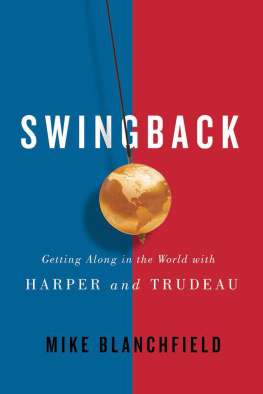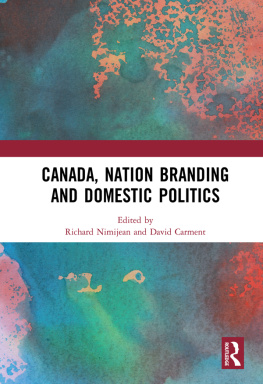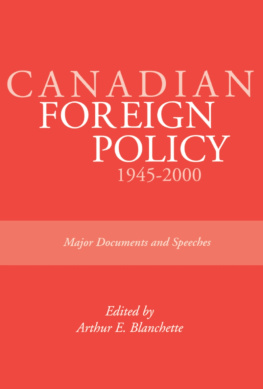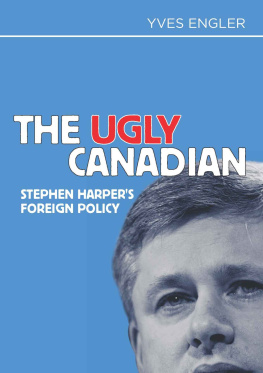SWINGBACK
SWINGBACK
Getting Along in the World with Harper and Trudeau
MIKE BLANCHFIELD
McGill-Queens University Press
Montreal & Kingston London Chicago
Mike Blanchfield 2017
ISBN 978-0-7735-4875-6 (cloth)
ISBN 978-0-7735-4897-8 (ePDF)
ISBN 978-0-7735-4898-5 (ePUB)
Legal deposit first quarter 2017
Bibliothque nationale du Qubec
Printed in Canada on acid-free paper that is 100% ancient forest free (100% postconsumer recycled), processed chlorine free
McGill-Queens University Press acknowledges the support of the Canada Council for the Arts for our publishing program. We also acknowledge the financial support of the Government of Canada through the Canada Book Fund for our publishing activities.
Library and Archives Canada Cataloguing in Publication
Blanchfield, Mike, 1964, author
Swingback : getting along in the world with Harper and Trudeau / Mike Blanchfield.
Includes bibliographical references and index.
Issued in print and electronic formats.
ISBN 978-0-7735-4875-6 (cloth). ISBN 978-0-7735-4897-8 (ePDF). ISBN 978-0-7735-4898-5 (ePUB)
FC649.B63 2016 | 327-71009051 | C2016-906046-2 |
C2016-906047-0 |
This book was set by True to Type in 11/14 Sabon
For Clara, Edie, and Kathy
Contents
Preface
The inspiration for this book goes back to a Paris hotel room in the summer of 2006. I had been travelling with Stephen Harper on his first major multi-country trip for about a week. Ive spent most of my career covering Canadian politics, sometimes abroad in the company of various prime ministers. He was my first Conservative prime minister, though I had covered the two previous Liberals and was to go on to cover Justin Trudeau.
I had been based on Parliament Hill for eight years for the Ottawa Citizen, but had deep interest in what was happening beyond Canadas borders. I started reporting outside Canada on my own dime at first, going to Eastern Europe in the spring of 1990. I visited the Prague headquarters of Vaclav Havels Civic Forum and reported on the first Czechoslovak election following the Velvet Revolution. I took myself to East Africa and Southeast Asia later in the decade before I was assigned to cover the 1999 NATO-led war against the former Yugoslavia, travelling to Kosovo in its aftermath. In 2001 and 2002, I spent many months on the road in Afghanistan, Pakistan, and throughout Central Asia covering the war that started after the September 11 attack on the United States. I returned to Pakistan, Afghanistan, and the region several times over the years. In 2003, I was part of a large team of journalists from the Citizen and Southam News that covered the U.S.-led war on Iraq and its aftermath. These, and other travels, as well as my time in Ottawa, gave me a unique perspective on where Canada had a part to play and where it didnt really matter at all.
This book is the result of the world coming to me and of me getting out into the world whenever I could. It was made possible by my past employer, the Ottawa Citizen, and my current one, the Canadian Press, who have always supported my attempt to understand Canadas role in the world. It is also the product of two years starting in 2013, when I returned to Carleton University in Ottawa, mid-career, to pursue a graduate degree at the School of Journalism and Communication. That period of academic analysis allowed me to step back and try to make some sense of what I witnessed and reported.
I have lived the story of this book. I reported it first-hand from Ottawa, from international war zones, from world capitals, legislatures, parliaments, and from many carefully staged photo-ops. Other talented journalists contributed to this narrative through their daily reportage and other writings, and Ive acknowledged them throughout this text. Returning to university plunged me into reading many more books, articles, and scholarly essays. Ive sourced that great writing in this book, and I encourage curious Canadians to read further, and deeper.
I asked Stephen Harper for an interview in early 2016 after his defeat, but I did not get a positive response. One day, I look forward to reading his memoirs. In the meantime, this is my view of how his unprecedented time in power played out on the global stage. In trying to assess it, I had a rewarding time researching our countrys history from the end of the Second World War to Harpers arrival in power in 2006. I watched him closely as he navigated the world on Canadas behalf. Since his departure from politics, Ive also benefitted from a front-row view of where the country is headed internationally under his successor, Justin Trudeau.
Who we are as a people is a combination of how we project ourselves to the world and how the world sees us. Our prime ministers play a big part in this. These two particular prime ministers, Stephen Harper and Justin Trudeau, defined Canadians in new, unusual ways. That set them apart from their predecessors.
Acknowledgments
The road to writing this book began when I returned to Carleton University in 2013 to pursue a masters in journalism twenty-six years after receiving my undergraduate degree. My goal was to put myself in a position where I would be forced to write something like this. I was inspired and helped along the way by numerous professors and fellow students. These include Paul Adams, Susan Harada, and Klaus Pohle.
Since coming to Parliament Hill in 1998 to cover defence and foreign affairs, I have worked in some powerhouse organizations, including the Parliamentary bureaus of the Ottawa Citizen-Southam News, and my current employer, the Canadian Press. I learned much from many, many talented colleagues over the years, and that continues every day. I will always hold a special place in my heart for those they know who they are whose reassuring voices on the telephone helped me do my job in dangerous places far away.
I owe thanks to the R. James Travers Foreign Corresponding Fellowship, which I won in 2013. It enabled me to travel to Europe, South Asia, and the United States to conduct research on cluster bombs, the seventh chapter of this book. This story would not have been told had it not been for the support of this fellowship.
I was very lucky to find myself working with Susan Glickman, a talented copy editor, who saved me from myself on several occasions. I also owe a special debt to Jacqueline Mason, my editor at McGill-Queens University Press, who championed this project and offered encouragement and valuable feedback as I pushed it towards the finish line. And Im forever grateful to Professor Randy Boswell, my Carleton University thesis adviser, who is a talented writer, storyteller, and a true student of history. His hard work, painstaking attention to detail, rigorous intellect, and passion for history and journalism infused this work.
Finally, there is my immediate and extended family, including my hardworking parents, Peter and Joann. I tried to get this done as quickly, efficiently, and unobtrusively as possible. But I didnt, so my sincere apologies.
With much love, this book is for my wife, Kathy, and our two daughters.
General Tommy Franks, the commander of the U.S. war on terrorism, arrives at Kandahar Air Field for an unannounced visit in the spring of 2002. Franks had no illusions that Western forces had vanquished the Taliban and al-Qaida. Photo by Mike Blanchfield.








